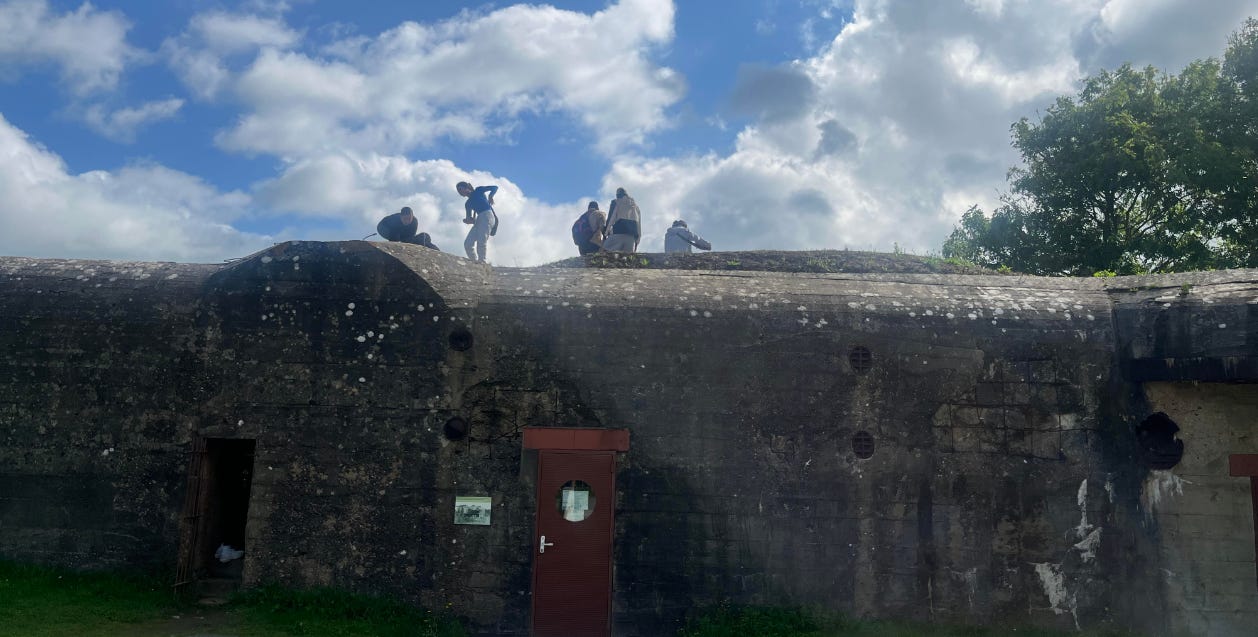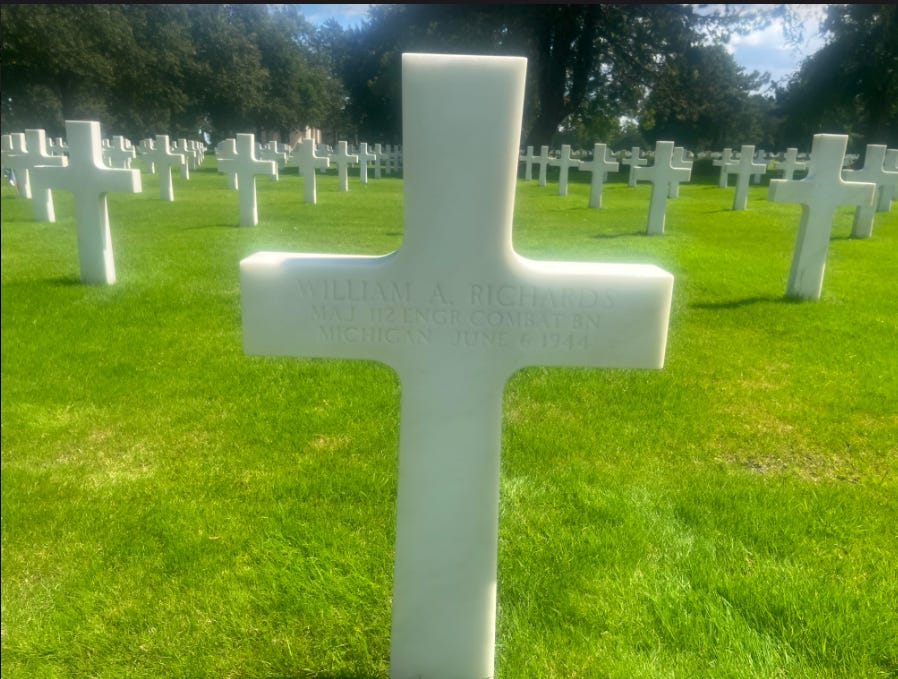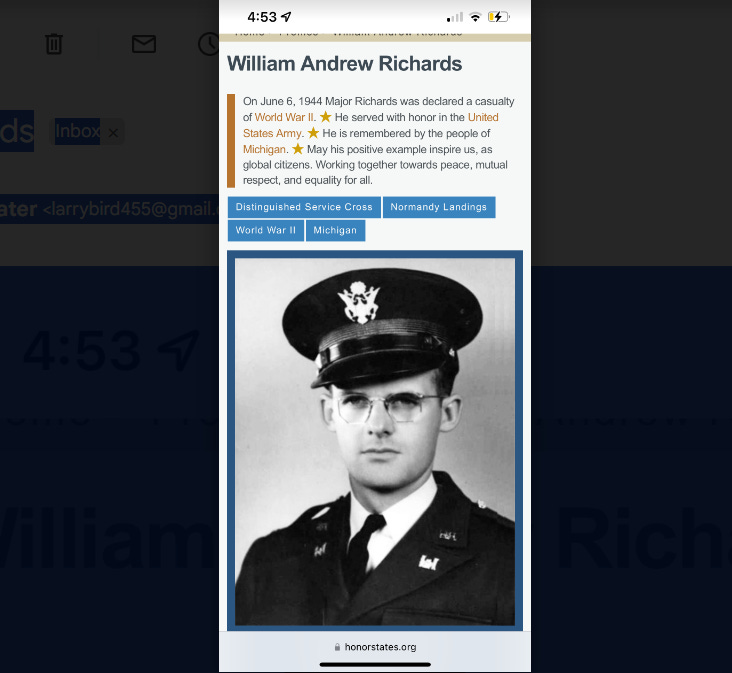A Life-Changing Week With Jake Schroeder For Denver High School Kids (and me)
Former Avs anthem singer now runs Normandy nonprofit centering on lessons of D-Day
It’s been about 72 hours since I returned home from eight days in France, most of which were spent as a chaperone to seniors-to-be from Arrupe Jesuit High School in North Denver. We were under the auspices of the D-Day Leadership Academy based in Saint-Mere-Eglise and run by longtime former Colorado Avalanche national anthem singer Jake Schroeder.
In these 72 hours, I’ve said an amazed, shake-of-the-head “yes” to myself on all the following:
Yes, I really did get to stay in an incredible old house right on a cobblestoned street in the heart of the village of Saint-Mere-Eglise - the first French town liberated by the Allies from German Nazi occupation following the D-Day Invasion on June 6, 1944, in World War II.
Yes, I really did get to spend a week there with a bunch of terrific students from Arrupe, along with three other teachers/chaperones from the school. Yes, I really did get to visit two of the historic beaches (Utah and Omaha) that were stormed by the Allies on June 6, 1944.
Yes, I really did get the honor of, along with the students, cleaning many headstones among the 9,388 American heroes who gave their lives in Normandy and rest in the Normandy American Cemetery, next to Omaha Beach - where the opening scene from the movie “Saving Private Ryan” was filmed.
Yes, I really did get to eat the incredible - incredible - cooking of D-Day Leadership Academy staffer and de facto den mother Michelle Coupey, whose baked escargot and ham and Swiss quiche - among other amazing dishes - will never be forgotten by moi and the students.
Yes, I really did get to spend some true quality time with Jake, the man we all so well remember from the more than 1,000 anthems he sang before Avs games. Jake Schroeder, let me just get out of the way quickly here, is one of the best people you’ll ever meet, a true renaissance man of sorts whose tireless work on behalf of the youth of Denver has been exported 5000 miles east to Saint-Mere-Eglise.
Yes, I really did get my wallet stolen, with all credit cards, cash, and ID inside, on the next-to-last day of the trip this past Wednesday on the Metro in Paris, by a pickpocket, the kind of which Jake warned me/us numerous times. “They’re the best in the world,” he said. Wish I’d listened harder to that advice before I put my wallet in a big, left front pocket while standing in a crowded subway car. But it could have been worse, as I’ll detail here later.
For me and I’m sure every one of the students and chaperones, it was a transformational experience of sorts. None of us will ever forget it, and there is a newfound bond among all of us that will never be broken.
And that’s the point of the D-Day Leadership Academy, a non-profit foundation with a stated mission to provide “an opportunity to underserved students to travel to another country on another continent; to get them out of their comfort zones and to see how big and wonderful the world is, and to teach them vibrant, important, wonderful lessons about American leadership.”
A major funder for D-Day Leadership Academy is John Hayes, a marvelous, generous man who was the longtime CEO of Ball Corporation - yes, that Ball Corp. whose name is on the arena where the Avs play - and former owner of the late, great Denver Cutthroats hockey club.
I’m going to write the rest of this story in kind of a stream-of-conscious fashion but with some of my best memories/observations to share:
First off, Jake. I mean, how do you describe a man who was the lead singer of a very successful band that played at Red Rocks nine times, Opie Gone Bad, who also was a legendary bartender at the Denver ChopHouse back in the day (I and the entire Avalanche team in those days were regular customers), is the former owner of a coffee company, a licensed pilot, a tireless volunteer for all kinds of Denver community endeavors, a father of three and a badass motorcycle rider whose thickly muscled shoulders and arms serve notice that it would be unwise to mess with him physically.
Jake isn’t a saint. He’s had some issues like the rest of us, some real ups and downs. I never really knew the real Jake Schroeder until maybe two or three years ago. Despite knowing him some in the late 1990s as a customer at the ChopHouse, I never really got to know the real person, even through all those years when he sang the anthem.
But that was very typically “me” from those days. I was, and often still am, very self-absorbed. I really only cared about getting my stories in on time for the Denver Post as the Avs beat writer, getting credit for the scoop, going to the gym and hitting the bars after games. I grew up loving guys like Hemingway and Fitzgerald, great writers but who each hit the bottle hard otherwise. I thought it was a romantic way to live, the way a real writer should live, and I hit it hard as well. Work hard, play hard. That was my philosophy.
But there was, and still is at times, an emptiness inside. I never felt all that great about myself. Yeah, I was proud that I became what I really most wanted to be - a sports writer, able to make a living writing words about games - but eventually, I became very disenchanted with myself. After several years, I started to think writing about hockey was a BS way to make a living, and that I wasn’t really contributing much to society. After nearly 20 years on the job, traveling all the time and working in what I knew was a dying industry, my cynicism took hold in all forms and got me into some bad habits.
While I never once loafed on the job covering the Avs and always put 100 into my stories, away from the actual job itself I became a bit lost. I was insufferable at times, short-tempered in airport and supermarket lines, huffy if the postgame quote sheet delivered free to me was a minute too late and sometimes complaining that my free pregame meal wasn’t sufficient.
Some of that existential angst was drummed out of me by people who told me, “Quit whining about being a sports writer. What you do actually gives me enjoyment in my spare time.” That made some sense to me and reminded me of the days as a youth when reading the local sports section was often the best part of the day.
I’d been offered to come to stay at the big maison in Saint-Mere-Eglise before by Jake, and would have joined Avs TV man Marc Moser as well, but always had some handy excuse not to go. Not this time. When Jake asked if I’d consider coming to Normandy in early August, to chaperone and be something of an unoffcial photographer and chronicler of sorts, I couldn’t come up with any good excuses and said yes. And I’m so happy I did.
First off, the kids…OMG were they good kids. They were all Hispanic kids from Arrupe, all of them very good students and all very well-mannered - due in no small part to their parents, two teachers named Ty and Patty, and a chaperone, Angela, whose daughter, Alejandra, was on the trip.
I met their entire party on Aug. 2 at Charles De Gaulle airport in Paris, and from there it was a nearly four-hour bus ride to Saint-Mere-Eglise, where Jake and Michelle would be waiting for us. For most of the ride, the kids either napped or constantly looked at their phones. Any conversation was short, with most everybody feeling shy around each other (and don’t forget, just because all these kids were in the same grade didn’t mean they’d all hung out together much like this).
When we got to SME, Jake was there with a big welcome and soon we were served multiple quiches, a nightly cheese plate (that’s always the second course in a proper French meal) and a dessert of chocolate mousse by the wondrous Michelle.
Here’s Jake making their acquaintance and going over some of the ground rules:
Can you see just a tinge of tiredness, lack of eye contact and general “who is this guy?” on the faces of some of the students? Well, let me tell you, by Day 2 or so of this experience, Jake started to have everyone’s full attention and respect. And, this was even after Jake had just told the students that they would not be able to have their cell phones for the rest of the trip, no questions and no exceptions. Jake continually emphasized that this was a trip for learning and for camaraderie, that they were in something of a sacred place in American and French history and that very, very few people of any age would be seeing and experiencing the kinds of things they would in the following days.
Boy, was he right. On the next day, after a tremendous, daily breakfast of fresh croissants, salami, cheese, fruit and aromatic French coffee, we all boarded the bus for Utah Beach, the first in the series of amphibious landings the Americans made on D-Day. A few scenes, first some of the kids atop a German bunker at Utah Beach:
Me, in the water of Utah Beach:
The dinner table inside the house that morning. from left to right, those are Arrupe teachers Ty and Patty, then chaperone Angela. All three were/are tremendous people. The next student over, Nathan, became a particular favorite of mine. Nathan kind of beats to his own drum, but is very intelligent and I saw a little bit of myself in him at his age (minus the intelligence).
Let’s talk a little more about Jake. Why is he now living parts of the year in SME, running a non-profit centering on D-Day? Much of the reason has to do with some of the same things I enunciated above about myself. Jake wanted to do more for others, especially two groups of people: kids, and veterans. Starting a program that teaches underserved kids the lessons of what the men and women of World War II did for future generations was a perfect fit.
Actual veterans from D-Day used to be visitors at the house, which is nicknamed “Maison Frank DeVita”, in honor of the D-Day Higgins boat operator who used to talk to visitors there all the time until his death at age 98. Now, there are very few still alive. So, it’s part of Jake’s true mission to pass along their lessons to as many young people as possible.
And, to people like me. Yeah, I read about D-Day in my history books in high school, but I never really knew anything about it and didn’t have any true appreciation for what they did. As I learned, it’s one thing to read about it in a book and it’s another thing entirely to actually be in the places where it all happened.
In our time there, we saw German bunkers that are still intact. We stood at the top of Pointe Du Hoc, where U.S. Army Rangers scaled 100-foot cliffs to get behind Nazi lines. We walked on the sands of Utah and Omaha and walked at night on a road in SME lined with the still-standing hedgerows, a road in which tired soldiers just off the landing craft - those who survived the machine-gun assault from the Germans - had to feel around in the dark that first night.
We also walked among the headstones of the fallen heroes at the Normandy American Cemetery, and I want to start to wind down this story with what that was like for everyone. The director of the cemetery, a wonderful man named Scott Desjardins, gave us the rare honor of cleaning many of the headstones, with brushes and soapy water.
Most of the students were 17 years old, the same age as some of the fallen. And that’s when it really hit home with them, what this was all about. That’s when the tears started flowing. Please click on this video of one of the students, Christina, talking about what that experience was like - which was universally shared by everyone else:
Here is teacher Ty Smith - a wonderful guy - talking about what it means to him, and what it means to him as a teacher of the kids (it came out sideways for some reason):
Myself, I had the honor of cleaning the headstone of Maj. William A. Richards, who died on D-Day, June 6, 1944:
Here is a story on Maj. Richards.
By the end of our trip, the shy, hesitant students and us chaperones were one big, loud family, everybody joking and laughing and singing and dancing and just having a great time. Here are a couple of typical scenes from the house in those final few nights.
We all stayed two more nights in Paris before flying home. On the next-to-last day, I got my pocket picked on the subway. All my cash (only 40 Euros), all my credit cards, driver’s license, a ton of other stuff in my George Costanza wallet - gone. Thankfully, my phone and passport were in my other pocket and those stayed. If they had been taken too, I would still be there probably.
But that wouldn’t have been the worst thing in the world, would it? My old self might have whined mightily over that (OK, I did get pretty mad for a few minutes), but you know what a week in Normandy learning about the heroes of D-Day teaches you?
To be grateful. To be very, very grateful. Thank you to Jake, Michele, the students and everyone else I met as part of that experience. Thank you to all the people whose funding has helped make it all possible, with a special reiterated shoutout to John Hayes.
And, I want to appeal to you here: The D-Day Leadership Academy is only made possible with contributions from others. When I say any money you might give is going to a good cause, you can see above what I’m talking about. Those kids’ lives will be forever changed, and I know they’re going to pay it forward in any way they can. They all have very bright futures ahead of them. (And you know what? None of them - zero - complained about not having their phones. You should have seen what a week without a cell phone can do for a youngster. It’s all good). So, please, consider giving a donation to Jake and the D-Day Leadership Academy. Click on this link right here to do so. Jake says, frankly, the nonprofit needs some more money right now to “be in the black.” I know my readers here will respond to anything Jake asks from his heart. Any donation is tax-deductible. And, from myself and Jake here: merci beaucoup.











Fascinating write-up! As a German, there isn’t much glory to be found on the beaches of Normandy or in any theater of WW2. But nonetheless it’s a history that profoundly shaped the lives of my family and the families of everyone I know. We own family portraits from our ancestors taken in the years prior to WW1 where 2/3 of the men pictured perished in senseless battles. My grandparents didn’t enjoy talking about this dark period, but my grandfather left an autobiography to us that describes the carnage in quite unsettling terms.
There is a very justified fear that with the disappearance of that generation of people who witnessed the bloodshed and destruction firsthand, as a society we are also losing the appreciation of our democratic institutions and a perspective of what the alternative invariably looks like.
I 2nd Karen's comment, wow !!!! How else or what else can you say. Any other words would distract, but to see kids engaged as they are and you engaged with them, is why I do what I do and it's one of the biggest rewards in life, to see a young person look at something different than before you met them is inspiring !!!! So proud of you Adrian !!!!!